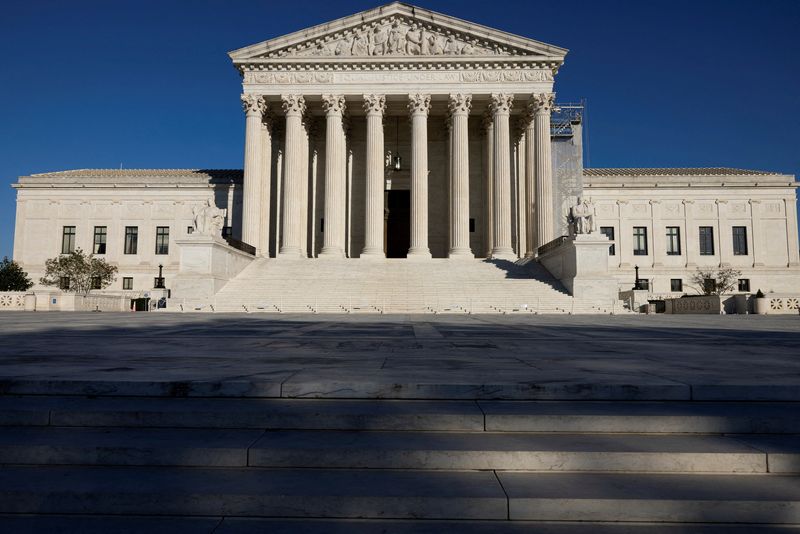US Supreme Court to hear South Carolina Planned Parenthood defunding case
Reuters
Published Dec 18, 2024 11:16AM ET
Updated Dec 18, 2024 03:36PM ET

By Andrew Chung
(Reuters) -The U.S. Supreme Court agreed on Wednesday to hear South Carolina's bid to cut off public funding to Planned Parenthood in a case that could bolster efforts by conservative-leaning states to deprive the reproductive healthcare and abortion provider of government money.
The justices took up South Carolina's appeal of a lower court's decision barring the Republican-governed state from terminating funding to Planned Parenthood South Atlantic, the organization's regional affiliate, under the Medicaid health insurance program because the organization provides abortions.
Planned Parenthood South Atlantic operates clinics in the South Carolina cities of Charleston and Columbia, where it provides physical examinations, screenings for cancers and other conditions as well as abortions.
The clinics annually serve hundreds of patients covered by Medicaid, a joint federal and state program that helps cover medical costs for low-income people. The U.S. government sets general rules for state Medicaid programs to follow, though each state runs its own program.
In deciding to hear the case, the Supreme Court has "made it clear that people's ability to choose their sexual and reproductive health care provider is in jeopardy," Planned Parenthood Federation of America President Alexis McGill Johnson said.
John Bursch, a lawyer with the Alliance Defending Freedom conservative religious rights group, which is representing the state in the case, said, "Pro-life states like South Carolina should be free to determine that Planned Parenthood and other entities that peddle abortion are not qualified to receive taxpayer funding through Medicaid."
It is the third time the defunding dispute from South Carolina has reached the Supreme Court, which in 2020 rejected the state's appeal at an earlier stage of the case. In 2023, the justices ordered a lower court to reconsider the state's arguments in light of a new ruling they had just issued.
South Carolina is one of numerous states that have moved to ban or restrict abortion since the Supreme Court in 2022 ended its recognition of a constitutional right to abortion by overturning Roe v. Wade, the landmark 1973 decision legalizing the procedure nationwide. South Carolina's ban on abortion after about six weeks was upheld by the state's highest court last year.
The Planned Parenthood affiliate and Medicaid patient Julie Edwards sued in 2018 after Republican Governor Henry McMaster ordered state officials to end the organization's participation in the state Medicaid program by declaring any abortion provider unqualified to provide family planning services.
The suit was brought under an 1871 law that helps people challenge illegal acts by state officials. At issue is whether Medicaid recipients have the right to challenge state determinations that exclude a particular healthcare provider - in this case the Planned Parenthood affiliate - from receiving federal funds.
A federal judge ruled in Planned Parenthood's favor, finding that Medicaid recipients may sue under the 1871 law and that the state's move to defund the organization violated Edwards' right to freely choose a qualified provider.
In March, for the third time, the Richmond, Virginia-based 4th U.S. Circuit Court of Appeals sided with the plaintiffs.

"Preserving access to Planned Parenthood and other providers means preserving an affordable choice and quality care for an untold number of mothers and infants in South Carolina," the 4th Circuit said in its ruling.
South Carolina's Department of Health and Human Services has argued that as a federal program enacted by Congress through its spending power, Medicaid does not unambiguously confer a right to sue government officials for alleged violations as required under Supreme Court precedent.
Written By: Reuters
Trading in financial instruments and/or cryptocurrencies involves high risks including the risk of losing some, or all, of your investment amount, and may not be suitable for all investors. Prices of cryptocurrencies are extremely volatile and may be affected by external factors such as financial, regulatory or political events. Trading on margin increases the financial risks.
Before deciding to trade in financial instrument or cryptocurrencies you should be fully informed of the risks and costs associated with trading the financial markets, carefully consider your investment objectives, level of experience, and risk appetite, and seek professional advice where needed.
Fusion Media would like to remind you that the data contained in this website is not necessarily real-time nor accurate. The data and prices on the website are not necessarily provided by any market or exchange, but may be provided by market makers, and so prices may not be accurate and may differ from the actual price at any given market, meaning prices are indicative and not appropriate for trading purposes. Fusion Media and any provider of the data contained in this website will not accept liability for any loss or damage as a result of your trading, or your reliance on the information contained within this website.
It is prohibited to use, store, reproduce, display, modify, transmit or distribute the data contained in this website without the explicit prior written permission of Fusion Media and/or the data provider. All intellectual property rights are reserved by the providers and/or the exchange providing the data contained in this website.
Fusion Media may be compensated by the advertisers that appear on the website, based on your interaction with the advertisements or advertisers.